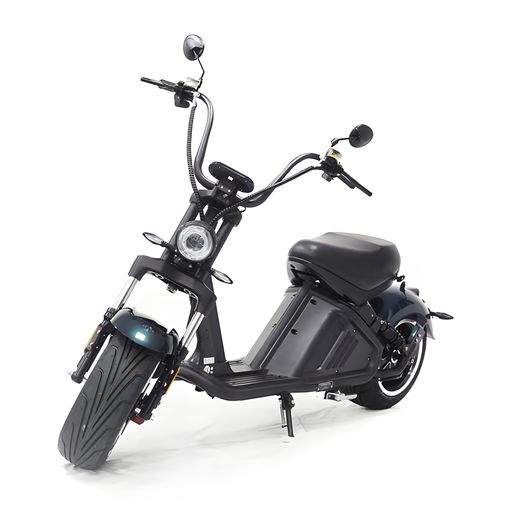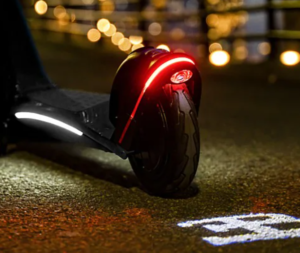The Future of Eco-Friendly Transport: Electric Scooters Leading the Way

Electric Scooters
The world is increasingly recognizing the environmental impact of fossil fuels, leading to a growing demand for renewable energy sources and eco-friendly modes of transport. As a result, the cost of electric scooters, bikes, and other forms of sustainable transportation is decreasing. Developing countries like Indonesia and Thailand, where gas-powered scooters, trucks, and small cars are prevalent, have tremendous potential for transitioning to electric scooters. In this blog post, we will delve into why electric scooters are the optimal choice for eco-friendly transport in the future.
The Need for Eco-Friendly Transport: Breaking Free from Traffic Jams and Pollution
Are you tired of being stuck in traffic jams, inhaling polluted air, and contributing to the ever-expanding carbon footprint? Envision a world where your daily commute is not only hassle-free but also environmentally friendly. Electric scooters have emerged as a revolutionary solution, providing a sustainable mode of transportation that has the potential to revolutionize urban mobility. But do they truly live up to our eco-conscious dreams?
Electric Scooters: Mitigating Traffic Congestion and Pollution
Electric scooters and bikes offer a compelling answer to the challenges of traffic congestion and pollution in our cities. These vehicles are easy to maneuver, park, and charge, and they do not emit harmful emissions. Additionally, they can save you money on fuel, maintenance, and insurance, making them a cost-effective choice..
The Rising Urbanization and Environmental Crisis
Recent years have witnessed a rapid increase in urbanization, resulting in overcrowded streets and alarming levels of pollution. Traditional gasoline-powered vehicles have played a significant role in this environmental crisis, emitting greenhouse gases and toxic fumes that degrade air quality and contribute to climate change. Shockingly, according to the World Health Organization, outdoor air pollution is responsible for an estimated 4.2 million premature deaths annually.
Electric Scooters: A Promising Alternative
Amidst these challenges, electric scooters have gained popularity as a promising alternative. These sleek and compact vehicles run on electricity, producing zero direct emissions and significantly reducing air and noise pollution. Their efficient design and maneuverability make them an ideal choice for navigating congested urban environments, offering a practical solution for short-distance travel.
Electric Scooters – Revolutionizing Eco-Friendly Transport
Electric scooters offer a compelling solution to the environmental and transportation challenges of our time. By promoting sustainable mobility and reducing our reliance on fossil fuels, these eco-friendly vehicles have the potential to revolutionize the way we commute. However, it is crucial to critically examine their impact, address current limitations, and develop effective regulations to ensure their integration into our transportation systems leads to a truly greener future.
Embracing Eco-Friendly Transportation: Exploring Sustainable Options
-
Bicycles: A Timeless Classic
Bicycles have long been hailed as a symbol of sustainable transportation. Not only do they provide a greener alternative to conventional vehicles, but they also offer numerous health benefits. By incorporating cycling into your daily routine, you can reduce harmful emissions while staying fit and healthy.
-
Scooters: The Trendy and Efficient Choice
Scooters, whether electric or manual, have gained immense popularity in recent years. With zero emissions and a sleek design, they provide an eco-friendly mode of transportation that is both convenient and stylish. Embrace this trend while contributing to a cleaner environment.
-
Hoverboards: A Futuristic Delight
While hoverboards may have seemed like a distant dream in the past, they are now a reality. These self-balancing wonders not only turn heads but also help mitigatepollution. Powered by electricity and emitting zero pollutants, hoverboards are an exciting option for eco-conscious individuals looking for a futuristic mode of transport.
-
Electric and Hybrid Vehicles: Driving Change
When it comes to reducing emissions, electric and hybrid vehicles are at the forefront. Innovations like Tesla cars have revolutionized the automotive industry by minimizing air pollution and carbon footprints. By embracing these technological marvels, you can significantly contribute to improving air quality and reducing the environmental impact associated with traditional gas-powered vehicles.
-
Carpooling: Sharing the Road to Sustainability
Carpooling is a simple yet powerful way to combat traffic congestion and reduce emissions. By sharing rides with fellow commuters, you not only decrease the number of vehicles on the road but also foster a sense of community. Many states have implemented dedicated carpool lanes to incentivize and streamline this eco-friendly practice.
-
Public Transportation: Efficiency in Motion
Public transportation systems, including buses, trams, and trains, play a vital role in sustainable urban planning. By utilizing these modes of transport, you actively contribute to reducing traffic congestion and the overall environmental impact of commuting. Moreover, public transit networks are continuously improving to provide faster and more efficient services.
-
Walking: A Step Towards a Sustainable Future
Sometimes, the simplest solutions have the most significant impact. Walking promotes a healthy lifestyle while requiring no fuel consumption or schedule coordination. By incorporating more walking into our daily routines, we can reduce our reliance on vehicles and minimize our carbon footprint.
Highlighting the Efficiency, Cost, Convenience, and Safety of Electric Scooters
Electric scooters offer numerous advantages over gas-powered alternatives, making them an optimal choice for eco-friendly transport. They are highly efficient, converting a larger proportion of energy into motion compared to internal combustion engines. This efficiency leads to lower operating costs, as electricity is generally cheaper than gasoline, and maintenance requirements are minimal. Additionally, electric scooters provide convenience for short trips and urban commuting, thanks to their easy parking and maneuverability in congested areas. Safety is prioritized with features such as anti-lock braking systems and improved stability.
A study conducted by the University of California, Berkeley, found that electric scooters are up to six times more energy-efficient than cars, establishing them as a sustainable and cost-effective transportation option.
Exploring the Market: Types and Features of Electric Scooters
The market offers a wide range of electric scooters with various types and features to suit diverse needs and preferences. Electric scooters can vary in terms of power, speed, and range. Some models cater to adventurous riders, offering higher speeds and longer ranges, while others prioritize compactness and portability. Additional features such as regenerative braking, suspension systems, and adjustable riding modes enhance the comfort and performance of electric scooters. Foldable models facilitate easy storage and transportation, off-road models come equipped with rugged tires, and seated scooters provide enhanced comfort for longer rides.
For instance, the Xiaomi Mi Electric Scooter boasts a 250-watt motor, a top speed of 15.5 mph, and a range of up to 18.6 miles, making it an excellent choice for daily commuting in urban areas.
Maximizing Performance and Lifespan: Best Practices for Electric Scooters
To ensure optimal performance and extend the lifespan of electric scooters, adhering to best practices for usage and maintenance is essential. Regularly checking tire pressure, brake functionality, and overall scooter condition is necessary to ensure safety and efficiency. Following manufacturer guidelines for battery charging, avoiding overcharging or deep discharging, is crucial to maintain battery health. Storing the scooter in a dry and secure place protects it from damage caused by moisture or theft. Wearing appropriate safety gear, such as helmets and knee pads, and following trafficrules and regulations further enhance the riding experience and ensure safety.
Overcoming Challenges to Adoption: Charging Infrastructure and Regulations
Despite the benefits, there are challenges and barriers to the widespread adoption of electric scooters. Limited charging infrastructure can be a barrier, as users may face difficulties finding accessible charging stations. Increasing the number of charging points and integrating them into existing infrastructure can help overcome this challenge. Additionally, collaborating with local authorities and policymakers to develop appropriate regulations and address any restrictions on electric scooter usage in certain areas is vital for their wider acceptance.
Paving the Way for a Greener Future
Electric scooters are leading the way towards a greener and more sustainable future of transportation. With their numerous advantages, including increased efficiency, lower operating costs, convenience, and improved safety, electric scooters provide an eco-friendly alternative to traditional gas-powered vehicles. By embracing electric scooters, we can reduce pollution, alleviate traffic congestion, and contribute to a cleaner and healthier environment. As we continue to embrace and improve upon this technology, it is crucial to address challenges, develop supportive infrastructure, and implement effective regulations to ensure a seamless integration of electric scooters into our transportation systems.
By providing education and awareness programs on safe riding practices and enforcing traffic rules can mitigate these concerns. Example: Several cities have successfully implemented initiatives to overcome barriers to electric scooter adoption. For instance, Barcelona expanded its charging infrastructure by installing charging stations throughout the city, making it easier for riders to recharge their scooters conveniently.
In conclusion, gas-powered scooters have a significant negative impact on the environment due to their emissions and reliance on fossil fuels. On the other hand, electric scooters offer numerous advantages such as increased efficiency, lower operating costs, convenience, and improved safety. The market offers a variety of electric scooter types and features to suit different needs and preferences. Following best practices and maintenance routines is crucial for maximizing the lifespan and performance of electric scooters. While there are challenges and barriers to the widespread adoption of electric scooters, strategies such as expanding charging infrastructure, addressing regulatory issues, and promoting safety can help overcome these obstacles. By embracing electric scooters as a sustainable and efficient mode of transportation, individuals and communities can contribute to a greener and healthier future. Together, let’s pave the way for a greener future through the adoption of electric scooters.
WARNING:

Before you go Enter the Draw for the Bugatti Electric Scooter Draw Here:
Ebikes Worth Mentioning Click Here
Back to Top
To use our purchasing process you must be 18 years of age or older to purchase any product on our website and not represent or purchase on behalf of anyone under this age as set at the point of purchase. The scooter will be registered on our database to the Name and Address etc of the purchaser.
This post or page may contain affiliate links that may earn a small commission at no additional cost to you. I use affiliate links because they allow me to share useful products and services with you that are related to the topic of my website. Affiliate links also help me earn some income from my website, which enables me to keep creating high-quality content for you. I appreciate your support and trust!
- Health Benefits of Electric Bikes
- What to Look for When Buying an E-bike
- Best Electric eBikes for Your Little One
- How to Safely Unlock the Top Speed on Unagi Electric Scooters
- Breaking: The Shocking Truth About E Scooter Laws in WA!
- Can You Ride Scooters On The Road “California”
- Can Electric Scooters Get Wet? Yes!
- How do I transport my electric scooter in a car?
- Top 6 Long Range Electric Scooters
- Two-Stroke or Four-Stroke? Gas Scooter Showdown
